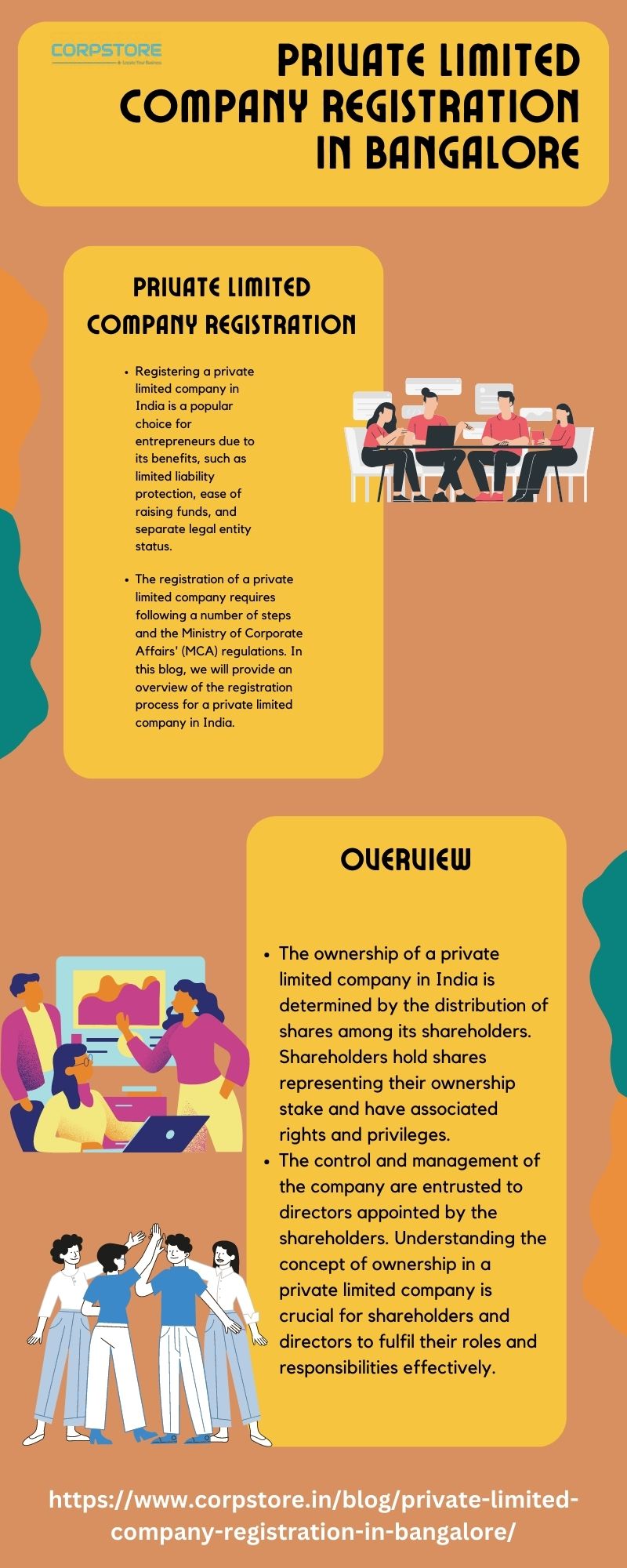Registering a private limited company in Bangalore is a popular choice for entrepreneurs due to its benefits, such as limited liability protection, ease of raising funds, and separate legal entity status.
The registration of a private limited company requires following a number of steps and the Ministry of Corporate Affairs’ (MCA) regulations. In this blog, we will provide an overview of the registration process for a private limited company in India.
Determine the Company Name:
The first step in Private limited company registration in Bangalore is to choose a unique name for the company. The name should not be identical or similar to existing company names or trademarks.
It is advisable to conduct a name availability search on the MCA’s website to ensure the chosen name is available for registration.
Obtain Digital Signature Certificate (DSC):
A Digital Signature Certificate is necessary for online filing of documents for Private limited company registration in Bangalore. Each director and shareholder of the company must obtain their own DSC.
Director Identification Number (DIN):
Every director of the company must obtain a unique DINS. This can be done by submitting an online application to the MCA along with the necessary documents, such as identity proof and address proof.
The Memorandum of Association (MOA) and Articles of Association (AOA):
Prepare the MOA and AOA, which outline the objectives, rules, and regulations of the company. These documents define the company’s scope of activities, share capital, and internal governance structure. It is recommended to seek professional advice or use standard templates for drafting the MOA and AOA.
Share Capital and Shareholders:
Determine the share capital of the company and the distribution of shares among the shareholders. The minimum authorized and subscribed share capital requirement has been removed, allowing companies to have a minimum share capital as per their needs.
Registered Office:
The Company to have Private limited company registration in Bangalore must have a registered office address in India where official communications can be sent and received. The address proof, such as utility bills or a lease agreement, should be submitted during the registration process.
File the Incorporation Application:
Prepare and file the necessary incorporation documents with the Registrar of Companies (ROC). The application should include the MOA, AOA, details of directors and shareholders, registered office address, and other required declarations.
Pay the Registration Fees:
Calculate the fees for Private limited company registration in Bangalore based on the authorized capital of the company and make the necessary payment online through the MCA portal.
Obtain Certificate of Incorporation:
After reviewing the application, if the ROC is satisfied with the documents and compliance, they will issue the Certificate of Incorporation. This document serves as proof of the company’s existence and includes important details such as the company’s Corporate Identity Number (CIN) and date of incorporation.
Register for Goods and Services Tax (GST):
If the company’s turnover exceeds the prescribed threshold, register for GST, which is required for the sale of goods and services in India.
Who owns Pvt Ltd Company?
A pvt ltd company with Private limited company registration in Bangalore is a separate legal entity, distinct from its shareholders. In India, the ownership structure of a private limited company is based on the distribution of shares among its shareholders.
Let’s delve into the concept of ownership in a private limited company and understand who owns it.

Shareholders:
The ownership of a company with Private limited company registration in Bangalore is determined by its shareholders, also known as members. Shareholders are individuals or entities that hold shares in the company, which represents their ownership stake.
These shares are typically issued at the time of incorporation or when additional capital is raised. Shareholders can include individuals, other companies, or even foreign entities.
Shareholding and Ownership:
The ownership of a private limited company is proportionate to the shares held by each shareholder. The number of shares a shareholder holds determines their ownership percentage in the company. For instance, if a shareholder owns 50% of the total shares, they have a 50% ownership stake in the company that has Private limited company registration in Bangalore.
Distribution of Shares:
The distribution of shares among shareholders is determined by various factors such as initial capital investment, agreements among the shareholders, and subsequent capital contributions.
Shareholders can hold different classes of shares, such as equity shares or preference shares, each carrying different rights and privileges. The allocation of shares can be equal or based on the contributions made by the shareholders for the company that has Private limited company registration in Bangalore.
Rights and Privileges:
Shareholders in a private limited company have certain rights and privileges associated with their ownership. These include the right to attend and vote at general meetings, the right to receive dividends, the right to participate in the company’s decision-making processes, and the right to share in the company’s profits in proportion to their ownership stake.
Shareholders may also have pre-emptive rights, allowing them to maintain their ownership percentage by subscribing to additional shares when the company issues new shares.
Directors and Shareholders:
While shareholders own the company, they appoint directors to manage and run the day-to-day operations.
The directors are responsible for making strategic decisions, complying with legal obligations, and safeguarding the interests of the shareholders.
Majority and Minority Shareholders:
In a company with Private limited company registration in Bangalore, there may be majority and minority shareholders. Majority shareholders hold a significant percentage of shares, often giving them control over decision-making processes and the overall direction of the company.
Minority shareholders, on the other hand, hold a lesser percentage of shares and may have limited influence over the company’s affairs. Minority shareholders’ rights are protected by company laws and regulations.
Share Transferability:
In a private limited company, the shares are typically not freely transferable. The transfer of shares requires compliance with the company’s Articles of Association and applicable laws.
Share transfer restrictions may be imposed to maintain control, protect the interests of existing shareholders, or comply with regulatory requirements.
However, shareholders can generally transfer their shares with the approval of other shareholders or as per the provisions mentioned in the company’s Articles of Association.
It’s important to note that the ownership structure and governance of a pvt ltd company with Private limited company registration in Bangalore are governed by the Companies Act, 2013, and its associated rules and regulations. These laws provide a framework for the rights and obligations of shareholders, the issuance and transfer of shares, and the overall functioning of the company that has Private limited company registration in Bangalore.
Conclusion
In summary, the ownership of a private limited company in India is determined by the distribution of shares among its shareholders. Shareholders hold shares representing their ownership stake and have associated rights and privileges.
The control and management of the company are entrusted to directors appointed by the shareholders. Understanding the concept of ownership in a private limited company is crucial for shareholders and directors to fulfil their roles and responsibilities effectively.



